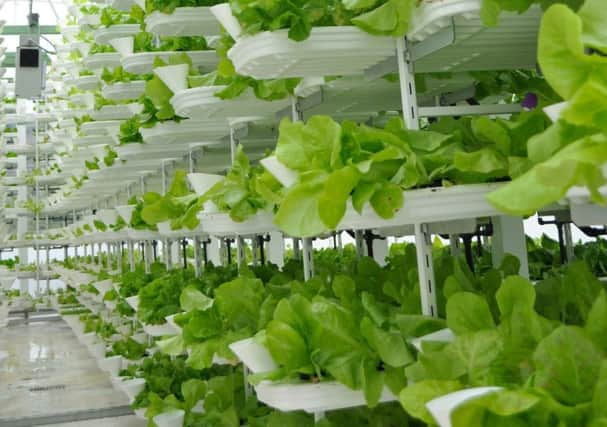UK's first vertical farm to be built in Scotland


Now the first vertical farm of its type in the UK is to be built in Scotland following a £2.5 million investment from the James Hutton Institute and Intelligent Growth Solutions (IGS).
Lettuce, baby leaf vegetables and microgreens are to be planted in the high-tech growing house near Invergowrie as part of a research project into how vertical farms can best produce crops for Scotland and beyond.
Advertisement
Hide AdAdvertisement
Hide AdThe method is being championed around the world –particularly in urban centres in the US as a way to grow food in small spaces without the need to transport the produce over long distances.
Crops are typically grown under LED lights with hydroponic systems using minimum water and no soil.
IGS predicts costs – such as those generated by lighting –will fall quickly to allow crops such as strawberries and tomatoes to be grown.
Henry Aykroyd, chief executive of IGS with 30 years experience in large-scale farming in the UK, Eastern Europe and California, said: “Our mission is to enable our customers to be the lowest cost producers by growing local globally, with better quality and saving natural resources. The process uses little water, no pesticides, can enhance taste and is consistent all year round.”
The Invergowrie farm will be the first in the UK to be built using automated towers which can respond to peaks and troughs of energy use.
Mr Aykroyd said: “Our real-time software can ‘grab’ power when the grid has surplus power and ‘shut down’ at peak times.
“Our automated growth towers are fully programmable to suit many diverse crops, and provide smart solutions to automation, power management and lighting issues,” he added.
Perth and Kinross Council has granted approval for the project with a 10-year lease now signed by the James Hutton Institute and IGS.
Advertisement
Hide AdAdvertisement
Hide AdProfessor Colin Campbell, Chief Executive of the James Hutton Institute, said: “We are doing more research with such innovative companies in the private sector and this example combines our knowledge of plant science and specialised infrastructure to work with others whose vision is aligned to help solve the challenges around long-term food security.”